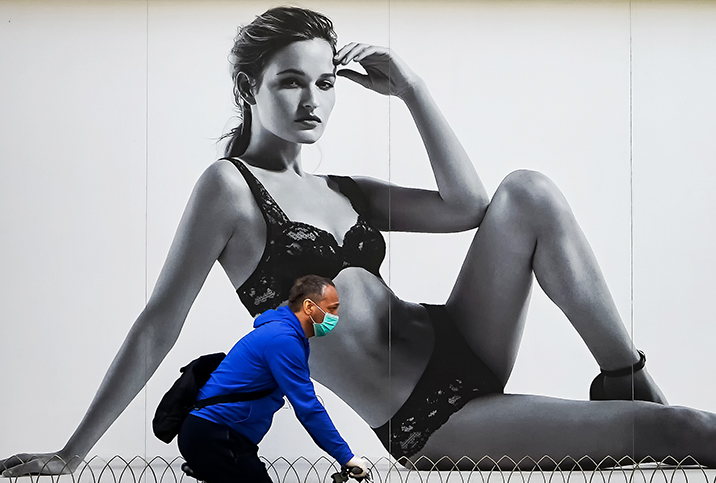Selling Sex in the New Post-COVID 'Normal'

Sex has been selling for more than a century, even when it's not exactly presented as such. An ad campaign launched in 1911 for Woodbury's soap was both instructive and influential. It's also hilariously coy by today's standards: The illustrated art features a man in a tuxedo tenderly embracing a delicate-looking woman whose gown teasingly falls off her shoulder. Her stare meets the prospective customer's eyes. The slogan: "A skin you love to touch."
The ad caused a scandal. It also worked: Woodbury's became a massive seller, and other campaigns have been taking their cues from the strategy ever since.
From tame to tawdry
That is, when a global crisis isn't getting in the way. The COVID-19 pandemic has made sex-based marketing not just unseemly over the past year, but seemingly harmful to public health. In 2021, Super Bowl ads—long dependable for their erotic undertones and overtones (Cindy Crawford cracking open a Pepsi is a '90s classic)—instead danced around the national unease, opting for nostalgia and celebrity-cameoing weirdness.
But now, ad firms have decided it's time to bring back unbridled lust. As Americans get vaccinated at a refreshingly steady rate, it's hard to ignore the bedroom-oriented eagerness among the single masses. The return of sex appeal in marketing is even harder to ignore: Suitsupply, known for its affordable garb designed for entry-level job interviews and last-minute wedding attire, created a minor storm on social media with its campaign announcing "The new normal is coming," accompanied by photos of young people sloppily making out open-mouth. Mockery directed at the shamelessly orgiastic approach was swift and intense.
Axe, never to be outdone when it comes to corporate lasciviousness, launched a competing campaign with the tagline "Smell ready." After all those lonely quarantine nights, "Readjusting won't be easy," the brand informs us, but aggressively scented body sprays and body washes might help you get lucky. (To be fair, given the dip in grooming routines during the pandemic, Axe might be doing a real public service.)
Bring sex back to the big screen
Meanwhile, none other than conservative (and pro-life Catholic) New York Times columnist Ross Douthat made a somewhat head-spinning declaration in the paper's opinion pages in March. "What the 2020s Need: Sex and Romance at the Movies," the headline shouted, and even staunchly anti-Douthat readers found themselves nodding along as he embraced the joys of "the cinema of desire." He wrote:
"But what about culture? If stagnation in the economy has been matched by sterility in social and artistic pursuits (it has), what would signify cultural acceleration or escape?
"Here's one possibility: We'll know we're actually entering a new era when sex and romance make a comeback at the movies."
Douthat essentially argues that people need more movies like "The Apartment" and, well, "Zack and Miri Make a Porno"—films gripped, whether in a romantic swoon or spontaneous horniness, by an undeniable need to screw.
Just a little taste will do
We may not have gotten there yet, what with Godzilla and King Kong currently ushering in the resurgence of theatrical moviegoing. But we're starting to get a fascinating taste of what sexuality on the big and small screens might look like in the post-COVID-19 era. Shonda Rhimes, ever the prognosticator of cultural hitmaking, leaned into period-piece salaciousness with "Bridgerton," the romantic fantasy she executive-produced and released at the end of 2020. For many people watching from their couches, it was a gloriously hot-and-heavy escape.
"Malcolm & Marie," a tumultuous romantic drama starring Zendaya and John David Washington and made during the pandemic, might've felt like a bummer when it hit Netflix in February. But the beautifully shot, self-consciously arty movie was also—in its own special way—incredibly hot. When they're not fighting over long-repressed resentments while holed up in their chicly minimalist California home, the couple at the story's center circle each other with carnal hunger. (It helps that Zendaya and Washington are sexy in a way most mortals can only dream to be.)
If "Malcolm & Marie" is the quintessential COVID-19 sex movie, and the Suitsupply and Axe ads are crass attempts at cashing in on post-vaccine libidos, then we can expect a more casual approach to sexuality in pop culture in the year to come. Once we get that initial rush, we're bound to adjust—even marketing departments. And sex always sells better when it's simmering. Sometimes all you need is Cindy Crawford, cozying up to a vending machine in jean shorts and a tank top, seeking something sweet and bubbly.


















